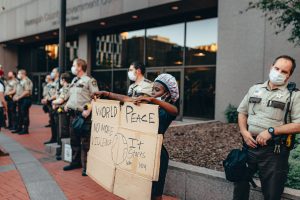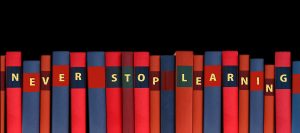Decolonisation of the curriculum – a conversation
We are joined by Dr Katherine Haxton, Senior Lecturer in Chemistry at Keele University, Dr Neil Williams, Director of Undergraduate Studies in the Faculty of Science Engineering and Computing at Kingston University, Dr Caroline Garaway Senior Lecturer in the Department of Anthropology at University College London and Anne Kimunguyi who is studying history, also at UCL.In this conversation we will be discussing what we mean by a decolonised curriculum and why it is important. Taking viewpoints from both the quantitative and qualitative disciplines, we consider what steps can be taken to deliver a more inclusive curriculum.
Kay: I have heard this term ‘Decolonisation of the Curriculum’ a lot recently, where did it come from?
Neil: Decolonisation of Higher Education originated as a movement two decades ago to ensure that the knowledge and practices of indigenous people were represented in the Higher Education curricula of post-colonial countries. More recently the ‘decolonising the curriculum’ agenda was reignited in South Africa in 2015 with the “Rhodes Must Fall” movement, where students demanded the removal of the statue to the colonialist, Cecil Rhodes, and for indigenous knowledge to be placed on an equal footing in the curriculum with that from the global north. This agenda has gained momentum in the UK, led by the National Union of Students ‘Why is my curriculum white?’ campaign which suggests that while the Arts and Humanities disciplines have the most work to do regarding decolonisation, all subjects have opportunities to reconsider teaching matter.
Kay: So what do we mean by “Decolonising the curriculum”? 
Anne: A colonial curriculum is characterised by its unrepresentative, inaccessible, and privileged nature. Unrepresentative, because it selectively constructs teachings which exclude certain, oftentimes, crucial narratives. Inaccessible, because it consequently prevents many of its recipients from identifying with the narratives construed, whilst appealing to a historically favoured demographic. Privileged, because it ensures the continued participation, comfort and flourish of this select group of people, in both an academic and a wider societal context. Sadly, and unacceptably, this all occurs at the detriment of a diverse range of marginalised voices.
What this suggests is that a colonial curriculum is also an inaccurate curriculum. That is, by virtue of its exclusionary and depreciatory tendencies, it simultaneously fails to provide the most truthful knowledge to those it caters to, whilst also discouraging many others from engaging with it. What such a curriculum can and cannot offer in terms of information, pedagogical practises and accessibility must be discussed if we want to ensure the most just education for the most amount of people.
Neil: The association of the term ‘decolonisation’ with repatriation to indigenous people has led people to question whether it is an appropriate metaphor. In some institutions, the focus has been on developing an inclusive curriculum that considers the broader diversity of all the protected characteristics, ethnicity being just one of them. There are diverse views of what ‘decolonising the curriculum’ means, but as well as the subject matter, it must also involve a reconsideration of who is teaching and how it’s being taught.
Caroline: To add to what is being said above I would very much agree that the term decolonising the curriculum is one that divides people in very strong ways. Our University has embraced the ‘inclusive’ curriculum as its institutional aim to “improve the experience, skills and attainment of all students, including those in protected characteristic groups, by ensuring that all students, regardless of background are able to participate fully and achieve at equal rates”. Learning from experiences at Kingston, the policy is very much aimed at reducing the proven BAME  attainment gap within the university and is said to be achieved by “allowing all students to relate to and engage more with academic material and assessments”. This requires a diversification of reading lists beyond white dead men and a diversification of assessments and more opportunity for formative work. Whilst not specifically relating to the curriculum it also requires more BAME role models within academia itself.
attainment gap within the university and is said to be achieved by “allowing all students to relate to and engage more with academic material and assessments”. This requires a diversification of reading lists beyond white dead men and a diversification of assessments and more opportunity for formative work. Whilst not specifically relating to the curriculum it also requires more BAME role models within academia itself.
In my experience people often don’t fully see how this is different from the decolonising the curriculum agenda particularly because, in many ways, it leads to some of the same things in practice (diversifying reading lists, paying attention to pedagogical practice and assessment). Discussing this at UCL, some students and staff favoured ‘decolonisation’ over ‘inclusivity’ because an ‘inclusive curriculum’ or ‘diverse curriculum’ suggests that ‘outsiders’ could ‘join the club’ and that their views ‘could be incorporated’ rather than a far more radical questioning of the cannon itself and the cultural authority that it is imbued with. It is the questioning of the moral authority of the cannon itself which I think is at the heart of the difference.
Critics say that an inclusive curriculum attempts to take politics and power out of the equation. To decolonise, not just to diversify, recognises that knowledge is marked by power relations in which straight white hetero upper class men, still have disproportionate prominence. If we question the cannon and its historically contextualised origins; then, rather than pretending we have a generic identity, questions of class, caste, race, gender, ability and sexuality are exposed and open to discussion…and the cannon open to change. Put this way the aim of a decolonized curriculum, unlike an inclusive one, is about much more than the attainment of individual students at any one University, as important as that is. Instead, and ultimately it is about transforming society, about breaking down structural inequalities and institutional racism and as centres of knowledge production, higher education should be leading the way on this.
Kay: Why do we need to address these assumptions?
Neil: One concern of the decolonising the curriculum initiative is that curriculum content still reflects a colonial legacy by presenting the white, global North intellectual tradition as superior and universal. This applies to all disciplines. If we only teach the work of white men, do we not marginalise the contributions of others? A consequence of this is that BME students can be under-stimulated by the content, leading to a feeling of exclusion.
Katherine: Many of the challenges facing humanity today will not be solved by Eurocentric practices and models of how the world works. We need new ways of thinking and approaching knowledge creation, curation and conveyance, and we need to embrace the complexity and challenge of dealing with the contradictions inherent in merging different systems of knowing. True globalization of higher education should not involve propagating one system of knowledge at the expense of others, but rather embracing the diversity and allowing two-way flow of ideas and approaches. Genuinely inclusive higher education allows all students to see themselves and their cultural backgrounds reflected in the curriculum at all levels.
Neil: That our curricula do not reflect the cultural and social backgrounds of all students studying at our institutions is extremely concerning and leads to adverse consequences for many of our students. The BAME attainment gap is a significant concern in many HE systems, a broad problem with many valid solutions.
Anne: The unfortunate consequences of a curriculum not yet decolonised have serious psychological, educational and societal ramifications, that can transcend beyond the academic environment. A lack of representative teaching has been shown to link to feelings of isolation and disconnect amongst staff and student bodies. Stark BAME attainment gaps and low satisfaction rates underline this, urging us to reconsider the limited scope of inquiry according to which academia is currently aligned with. Educational institutions which do not acknowledge not only the insensitiveness of these approaches, but also these tangible mental health concerns, run the risk of alienating large groups of students and staff with whom they could otherwise engage with in a reciprocally beneficial relationship. The upholding of statues dedicated to well-documented white-supremacists or the white-washing of controversial, problematic historical figures whilst dedicating syllabi to their ‘untarnishable’ achievements are examples of this. It is imperative that institutions recognize that the knowledge they directly and indirectly produce moves beyond the academic sphere. It impacts the way in which students go on to successfully dismantle or uphold, legitimise or reject toxic social and political practises. Thus, the framework through which knowledge is distributed must always be aligned with notions of accuracy and diversity, if we are to prevent the reproduction of privileged narratives in wider societal contexts. ‘Decolonisation’ of curriculum is key in achieving this.
Kay: What does this look like in practice?
Neil: How we select and value knowledge is related to our past experiences and other factors that we may not be fully aware of. It also encompasses approaches to learning and teaching that are heavily influenced by the practice of Western Europeans, frequently at the expense of other pedagogical practices from around the world.
Anne: In practise, decolonising higher education can and does take many different forms. From inquiries into educational accessibility, as done by David Lammy in his 2017 Oxbridge Access Data campaign, to ensuring a multi-faceted representation of certain narratives in teachings. I personally really appreciated it when, in a module on the history of Western Political thought, my professor dedicated a portion of his lectures to John Locke’s highly problematic justifications of the trans-Atlantic slave trade, whilst also avoiding a belittled consideration of his significant and arguably progressive contributions to theories of modern-day liberty. As such, it was left to us, the learners, to decide how, or even if, to reconcile these two juxtaposing viewpoints. Examples like this highlight the diverse and progressive nature that a more ‘decolonised’ approach to education can take: it does not necessarily entail the replacement or prioritisation of one strand of information for another. Instead, it recognizes the importance of including both.
Neil: At Kingston University, we have addressed this through our Inclusive Curriculum framework, which has three core principles, to:
- Create an accessible curriculum
- Enable students to see themselves and their backgrounds reflected in the curriculum
- Equip students with the skills to positively to and work in a global and diverse world
It recognises that the issues need to be considered throughout the curriculum from the conception, through content, learning and teaching, assessment, to feedback and review.
 Kay: What has been the impact of this work?
Kay: What has been the impact of this work?
Neil: The application of this framework to one chemistry modules showed a large decrease in the BME attainment gap for the module. Changes included replacing some lectures with project based learning which enabled students to construct their own curriculum, and provision of more accessible teaching and assessment through online video support and automated in-class assessment/feedback of practical work and a seen exam question on the final exam paper.
Kay: Anne, you were involved in the UCL Changemakers: Decolonising the Curriculum project, what impact did that have?
Anne: The project was significant in bringing the notion of ‘decolonising’ to the forefront of pedagogical discussion. Crucially, the very term itself: ‘decolonisation’, was debated at the conference, highlighting the complexity of its definition. This conceptual framework ought to be consistently evaluated, questioned and analysed for its ability to fully encompass what it is we want to achieve. Whether this effort is to be focused primarily on the inclusion of marginalized narratives in curricula, or on the reconstruction existing ones, the meaning of the term changes, and so does, potentially, its viability in this enterprise. I would argue that the entire nature of our educational landscape must be met with a dramatic redress. From restructuring syllabi, to ensuring diverse staff and students, to changing what we are taught and how we are taught it, these initiatives fall under the umbrella of this wider agenda. Their relation to one another is undeniable. Whether the term ‘decolonisation’ is capable of encompassing these complex layers of contingency is an issue still up for much debate, but should not detract from our efforts in trying to achieve them; be it on a smaller, more specific level.
Caroline: Practically, all the things discussed so far may well be enough to deal with the BAME attainment gap and certainly there is increasing evidence that where these things happen, the gap is indeed reduced. But to truly ‘decolonize’ the curriculum I would suggest requires a lot more than this. Curricula need to be transformed not added to and/or, new material just assimilated. This would require far more radical change and in particular require academia to face up to/confront the discomfort of white privilege and be prepared to radically rethink what constitutes ‘knowledge’. I don’t think it is quite ready for that yet! Getting more BAME scholars into academia is critical.
Kay: To conclude, there has been a lot of debate about definitions, why is that important?
Caroline: The whole subject about terminology was brought up time and time again in our work at UCL, and I don’t think this is trivial. Some consider decolonisation a powerful metaphor, whilst others suggested it was unhelpful because we need to add colonial history not remove it and work through the aftermath of empire and colonialism; it also fails to recognise other forms of inequality. Some said it inspired, some said it irritated! It certainly reflects a lack of clarity across the sector with different terms being suggested as meaning the same thing. But it also reflects a discomfort. It brings up difficult issues about racism and ‘white fragility’. It asks academics to question what they know and how they know it and conversely what they don’t know and why. This is uncomfortable. Very uncomfortable. In these circumstances It is not hard to see why the less controversial ‘inclusive’ agenda is easier to digest. This would appear, at least on the surface, just to require taking practical steps to make sure all students from all backgrounds feel included, so that they can see reflections of themselves in what they are taught and they are assessed in a way that allows them to reach their potential. This is something that most academics can I’m sure, get on board with.
Author:
Dr Kay Hack, is Principal Adviser (Learning and Teaching) at Advance HE. Her role includes developing, managing and promoting excellence in teaching and learning, both generally and within STEM disciplines. She delivers a range of services to the HE sector, including supporting strategic leadership and change in HEIs and building and maintaining strong relationships with the STEM community, PSRBs, government and other organisations and individuals.
She has worked with a diverse range of Higher Education providers, including Russell Group, pre and post 1992 institutions, MillionPlus Universities, and College Based Higher Education (CBHE) providers, on key themes which aim to improve the student experience and outcomes. She has expertise in Curriculum Review, Assessment and Feedback, Technology Enhanced Learning, Flexible Learning, and Students as Partners, and has delivered change programmes in many parts of the world.
Kay is qualified to design and facilitate meetings and projects using the LEGO® SERIOUS PLAY® methodology. LEGO® SERIOUS PLAY® is an approach to facilitation that ensures all voices and viewpoints are captured, enabling the development of a shared understanding of issues, challenges or opportunities. Kay has successfully facilitated workshops using LEGO® SERIOUS PLAY® with a range of groups, from students to Vice-Chancellors.
——————————————————————————————————————————————————————————————
This blog is kindly repurposed from AdvanceHE and you can find the original here: Decolonisation of the curriculum – a conversation
